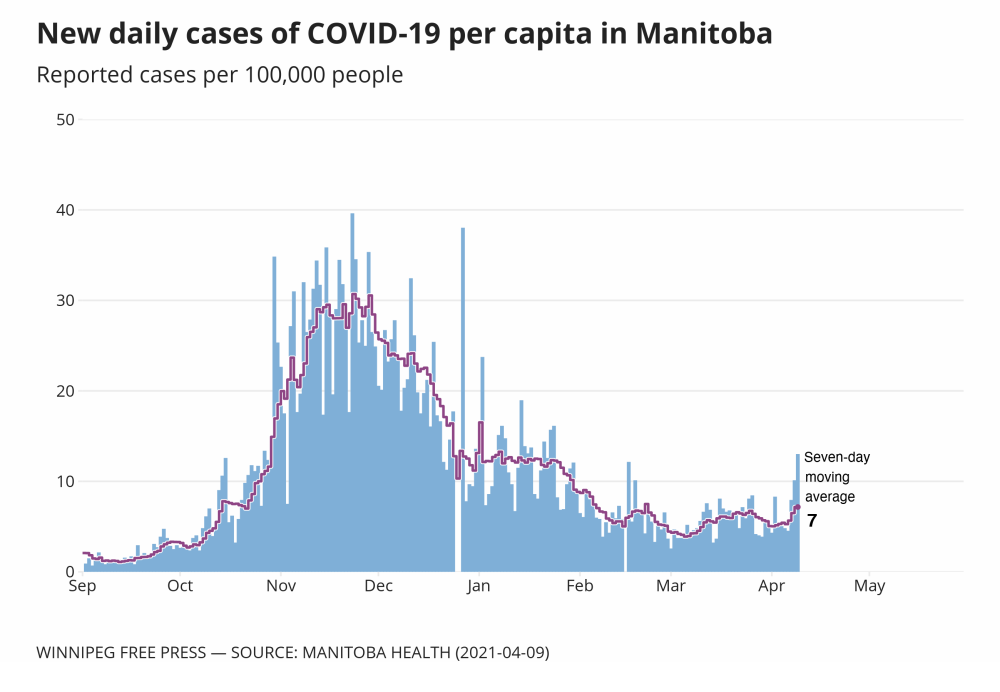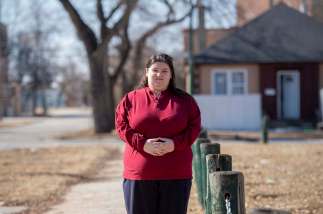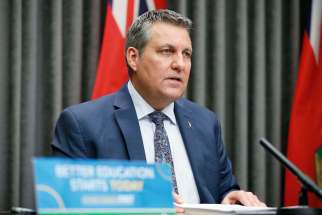Task force on top of third wave in case vaccine eligibility needs to change Manitoba reports 179 daily cases; variant infections rise
Read this article for free:
or
Already have an account? Log in here »
To continue reading, please subscribe:
Monthly Digital Subscription
$0 for the first 4 weeks*
- Enjoy unlimited reading on winnipegfreepress.com
- Read the E-Edition, our digital replica newspaper
- Access News Break, our award-winning app
- Play interactive puzzles
*No charge for 4 weeks then price increases to the regular rate of $19.00 plus GST every four weeks. Offer available to new and qualified returning subscribers only. Cancel any time.
Monthly Digital Subscription
$4.75/week*
- Enjoy unlimited reading on winnipegfreepress.com
- Read the E-Edition, our digital replica newspaper
- Access News Break, our award-winning app
- Play interactive puzzles
*Billed as $19 plus GST every four weeks. Cancel any time.
To continue reading, please subscribe:
Add Free Press access to your Brandon Sun subscription for only an additional
$1 for the first 4 weeks*
*Your next subscription payment will increase by $1.00 and you will be charged $16.99 plus GST for four weeks. After four weeks, your payment will increase to $23.99 plus GST every four weeks.
Read unlimited articles for free today:
or
Already have an account? Log in here »
Hey there, time traveller!
This article was published 09/04/2021 (1706 days ago), so information in it may no longer be current.
The arrival of the third wave in Manitoba and the rise of highly contagious strains of COVID-19 have prompted public health officials to reconsider how vaccines are prioritized.
Manitoba’s task force is looking to expand priority groups for immunization as officials watch neighbouring provinces adjust to the B.1.1.7 variant that’s firmly taking hold. The strain, which was first detected in the U.K., attaches to human cells much more easily and spreads faster. Researchers still don’t know why the variant makes some people sicker.
On Friday, Dr. Joss Reimer, medical lead for Manitoba’s vaccine task force, confirmed a third wave has arrived in Manitoba, bringing with it increased case counts and higher proportions of highly contagious variants that spread much faster and cause more hospitalizations, even among younger people. The U.K. variant has become the dominant strain in some jurisdictions, including Alberta.
NDP calls for improved vaccination plan
Reacting to the arrival of the third wave in Manitoba, the Opposition health critic called on the province to improve its vaccine rollout.
In a statement, NDP health critic Uzoma Asagwara urged the province to speed up immunization.
Reacting to the arrival of the third wave in Manitoba, the Opposition health critic called on the province to improve its vaccine rollout.
In a statement, NDP health critic Uzoma Asagwara urged the province to speed up immunization.
“We know Manitobans are worried about the arrival of the third wave in in our province when so many of our loved ones are still waiting for the vaccine. Now more than ever it’s important that the government fix the mistakes of their vaccine rollout that left doses in freezers instead of in arms, and execute an effective plan to vaccinate Manitobans to mitigate the impacts of the third wave. Manitobans are doing their part – it’s time for the government to stop making excuses and make vaccinating Manitobans their number 1 priority.”
“Right now, this means that the actions of all Manitobans are critical to ensure that we continue to protect each other. Reduce the number of contacts that you have. Stay home as much as possible,” Reimer said during a news conference.
All Manitobans 60 and older are eligible to be vaccinated, as are First Nations people 40 or older. Those groups are still at highest risk based on the province’s data, but if that changes, the task force has promised to adjust the rollout.
Reimer said officials are analyzing the local epidemiology and looking at trends in other provinces.
“If we see that there’s a clear trend where a new population is at higher risk than what we saw when we made the initial decisions, then we will absolutely change our approach and ensure that whatever population is experiencing those severe outcomes is prioritized,” Reimer said.
“So far what we’ve seen in Manitoba, still shows us that older Manitobans are at highest risk, so we still want to make sure that we get everybody over 60 immunized as quickly as we can.”
Earlier this week, the Ontario government changed its vaccine eligibility criteria to include adults 55 and older who live in COVID-19 hot spots. In Toronto, the government announced it would launch clinics to immunize people 18 and up in high-risk communities. Educators in the Peel region of Ontario are also being prioritized for vaccination.
Ontario’s approach is smart, said University of Manitoba virologist Dr. Jason Kindrachuk, because it’s considering where transmissions are most likely to occur as well as hospitalization rates among different groups. There is plenty of data from other jurisdictions that show younger people are being admitted to intensive-care units in higher numbers. That means pandemic responses can’t simply look at who is most at risk of dying, but who is at risk of getting seriously ill.
Manitoba has the advantage, Kindrachuk said, to be able to watch what’s happening in other provinces.
“Science is all about not only doing things based on… a provable hypothesis, but also learning as we go along,” he said.
“This is one of those periods where the playing field has gotten a little bit different.”
Johanu Botha, operations lead for Manitoba’s task force, said his team will be able to switch gears to deliver a higher volume of vaccine each day or to specified populations, if public health officials determine it’s necessary to change eligibility.
“We will adjust… the moment that there is different medical direction on how we should deliver vaccine and to whom. Our planning and operational side is ready,” Botha said.
“So far what we’ve seen in Manitoba, still shows us that older Manitobans are at highest risk, so we still want to make sure that we get everybody over 60 immunized as quickly as we can.” – Dr. Joss Reimer
Reimer said it is difficult to predict if and when public health might expand or change the priority groups.
She said decisions on priority access will be based on evidence collected by the epidemiology and surveillance team.
“If they very quickly see that there’s good data from multiple provinces that show clear trends, then we’ll have our answers quite quickly and by the next time we have this press conference, I might be able to announce a shift in approach,” Reimer said.
“It’s also possible that either the details in the data from other provinces are not fully fleshed out yet or that the trends aren’t as clear as we’d like. That would mean it will take longer for us to ensure that we’re prioritizing the right people,” she added. “Certainly, as soon as we have clear trends in front of us, we’ll move. There’s no reason to wait if we know who’s at highest risk.”
Over the past month, the seven-day average for new COVID-19 cases nearly doubled in Manitoba, said Winnipeg epidemiologist Cynthia Carr.
She said the provincial government was prudent by slowly rolling back restrictions beginning in January, and with the latest increase in cases, it made the right choice to keep current restrictions in place until the end of the month. Now, because of the variants and the severity of illness among younger people, she said vaccination priorities may need to change.
By vaccinating people who are at risk of exposure alongside those who may become very sick from COVID-19, spread of the disease can be reduced, she said.
“We have to react again and reprioritize,” Carr said.
Three more deaths, 179 new cases and an increase in highly contagious variants were announced Friday. There were 37 newly detected cases involving more infectious strains of the virus, the majority of them involving the B.1.1.7 variant, bringing the total number of highly contagious variant cases in Manitoba to 376.
danielle.dasilva@freepress.mb.ca
katie.may@freepress.mb.ca


Katie May is a general-assignment reporter for the Free Press.
Our newsroom depends on a growing audience of readers to power our journalism. If you are not a paid reader, please consider becoming a subscriber.
Our newsroom depends on its audience of readers to power our journalism. Thank you for your support.


.png?w=1000)








